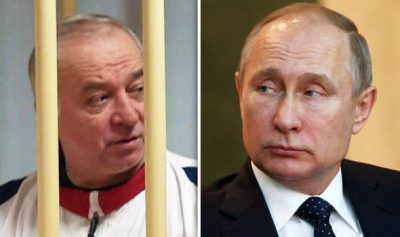Putin Just Did a 180 on the Skripal Affair and Raised Countless Questions

President Putin told Oliver Stone in an interview that he doesn’t believe that the British authorities were responsible for poisoning Sergei Skripal and his daughter, with this revelation representing a 180 on Russia’s previously articulated official position on the matter and raising countless questions about why the country’s leader would wait nearly a year and a half before sharing this new narrative after his top government officials and publicly financed international media outlets went all out saying the opposite.
***
The Alt-Media Community is dumbfounded after President Putin told Oliver Stone in an interview that he doesn’t think that the British authorities were responsible for poisoning Sergei Skripal and his daughter. So as not to be accused of “cherry-picking” the facts, here’s the full context of exactly what he said as published on the Kremlin’s official website (the most relevant exchange is bolded for emphasis):
“Oliver Stone: Russian bombs in Syria. What has happened to Skripal? Where is he?
Vladimir Putin: I have no idea. He is a spy, after all. He is always in hiding.
Oliver Stone: They say he was going to come back to Russia. He had some information.
Vladimir Putin: Yes, I have been told that he wants to make a written request to come back.
Oliver Stone: He knew still and he wanted to come back. He had information that he could give to the world press here in Russia.
Vladimir Putin: I doubt it. He has broken the ranks already. What kind of information can he possess?
Oliver Stone: Who poisoned him? They say English secret services did not want Sergei Skripal to come back to Russia?
Vladimir Putin: To be honest, I do not quite believe this. I do not believe this is the case.
Oliver Stone: Makes sense. You do not agree with me?
Vladimir Putin: If they had wanted to poison him, they would have done so.
Oliver Stone: Ok, that makes sense. I don’t know. Who did then?
Vladimir Putin: After all, this is not a hard thing to do in today’s world. In fact, a fraction of a milligram would have been enough to do the job. And if they had him in their hands, there was nothing complicated about it. No, this does not make sense. Maybe they just wanted to provoke a scandal.
Oliver Stone: I think it is more complicated. You know, you think I am much too much of a conspiracy guy.”
As is clearly seen from the above, President Putin doesn’t think that British intelligence had anything to do with this affair, despite his country’s previously articulated official position on the matter being the opposite, and his top government officials and publicly financed international media outlets going all out to support the original narrative for nearly a year and a half.
The Russian Ambassador to the UN originally accused the UK and its allies of orchestrating the attack, which is now known to have been partially false after President Putin absolved the British authorities of any responsibility for what happened while nevertheless still leaving open the possibility that an unnamed third party (probably implying the US) was behind this dangerous conspiracy.
The Russian spy chief also ran with the original version of events, which he described as “a grotesque provocation crudely concocted by U.S. and British security services”, but he too is partially discredited by none other than President Putin himself. All of this raises countless questions about why the Russian leader waited nearly a year and a half before sharing this new narrative.
Only President Putin himself can of course account for why he let so many people, both in the Alt-Media Community and more importantly at the highest levels of his own government, put their professional reputations on the line alleging that the British authorities had something to do with Skripal’s poisoning, but considering the current international context, there might be a logical reason why he changed his tune.
Russia is presently trying to negotiate a “New Detente” with the US — the odds of which are being bolstered by his political breakthroughs with France and Italy, as well as his country’s recent “balancing” of Chinese influence in Africa — and it would tremendously help Moscow if it was able to get London on its side during this very sensitive diplomatic time.
Boris Johnson will probably end up being the UK’s next Prime Minister, which brings with it the opportunity of resetting bilateral relations, which might be why President Putin said last month that “we need to turn this page connected with spies and assassination attempts”. With this in mind, that might explain why he decided to do a 180 on the Skripal case and say that the British government didn’t have anything to do with it.
In President Putin’s strategic calculations, the reputations of his top government officials and publicly funded international media are worth risking in pursuit of bringing the UK onboard Russia’s “New Detente” with the West, believing that they can always be repaired in the event that this narrative gambit succeeds. If it doesn’t, however, then Russia might have just dealt major self-inflicted damage to its soft power for nothing at all.
*
Note to readers: please click the share buttons above or below. Forward this article to your email lists. Crosspost on your blog site, internet forums. etc.
This article was originally published on Eurasia Future.
Andrew Korybko is an American Moscow-based political analyst specializing in the relationship between the US strategy in Afro-Eurasia, China’s One Belt One Road global vision of New Silk Road connectivity, and Hybrid Warfare. He is a frequent contributor to Global Research.

